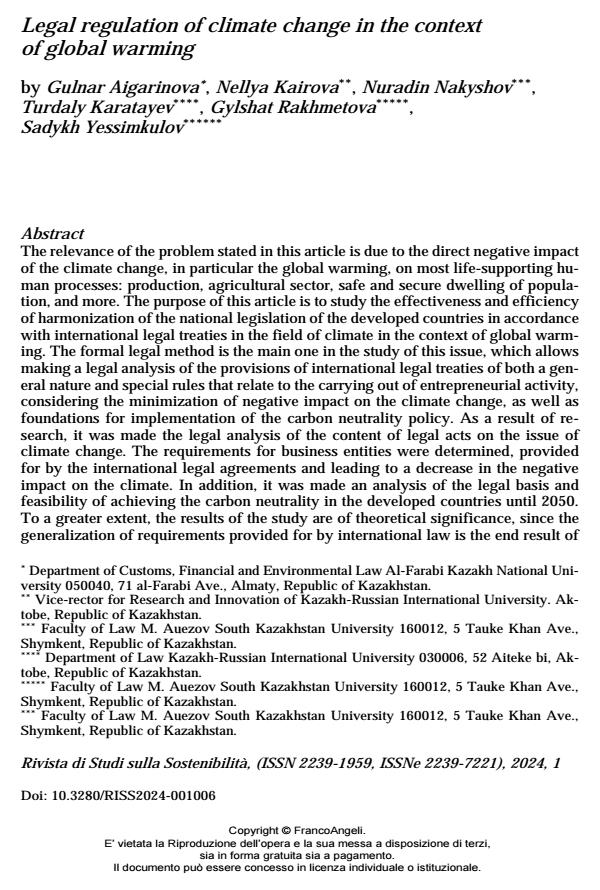Legal regulation of climate change in the context of global warming
Titolo Rivista RIVISTA DI STUDI SULLA SOSTENIBILITA'
Autori/Curatori Gulnar Aigarinova, Nellya Kairova, Nuradin Nakyshov, Turdaly Karatayev, Gylshat Rakhmetova, Sadykh Yessimkulov
Anno di pubblicazione 2024 Fascicolo 2024/1
Lingua Inglese Numero pagine 17 P. 85-101 Dimensione file 69 KB
DOI 10.3280/RISS2024-001006
Il DOI è il codice a barre della proprietà intellettuale: per saperne di più
clicca qui
Qui sotto puoi vedere in anteprima la prima pagina di questo articolo.
Se questo articolo ti interessa, lo puoi acquistare (e scaricare in formato pdf) seguendo le facili indicazioni per acquistare il download credit. Acquista Download Credits per scaricare questo Articolo in formato PDF

FrancoAngeli è membro della Publishers International Linking Association, Inc (PILA), associazione indipendente e non profit per facilitare (attraverso i servizi tecnologici implementati da CrossRef.org) l’accesso degli studiosi ai contenuti digitali nelle pubblicazioni professionali e scientifiche.
The relevance of the problem stated in this article is due to the direct negative impact of the climate change, in particular the global warming, on most life-supporting human processes: production, agricultural sector, safe and secure dwelling of population, and more. The purpose of this article is to study the effectiveness and efficiency of harmonization of the national legislation of the developed countries in accordance with international legal treaties in the field of climate in the context of global warming. The formal legal method is the main one in the study of this issue, which allows making a legal analysis of the provisions of international legal treaties of both a general nature and special rules that relate to the carrying out of entrepreneurial activity, considering the minimization of negative impact on the climate change, as well as foundations for implementation of the carbon neutrality policy. As a result of research, it was made the legal analysis of the content of legal acts on the issue of climate change. The requirements for business entities were determined, provided for by the international legal agreements and leading to a decrease in the negative impact on the climate. In addition, it was made an analysis of the legal basis and feasibility of achieving the carbon neutrality in the developed countries until 2050. To a greater extent, the results of the study are of theoretical significance, since the generalization of requirements provided for by international law is the end result of the study, which together will lead to a decrease in the impact of global warming on climate change, states, business entities and individuals. In turn, the results of this study can be the basis for improving the mechanisms of influence on the climate both in the field of legal sciences and technical sciences. .
Parole chiave:international cooperation, environmental law, climate, the Paris Protocol, environmental safety, climate neutrality
Gulnar Aigarinova, Nellya Kairova, Nuradin Nakyshov, Turdaly Karatayev, Gylshat Rakhmetova, Sadykh Yessimkulov, Legal regulation of climate change in the context of global warming in "RIVISTA DI STUDI SULLA SOSTENIBILITA'" 1/2024, pp 85-101, DOI: 10.3280/RISS2024-001006